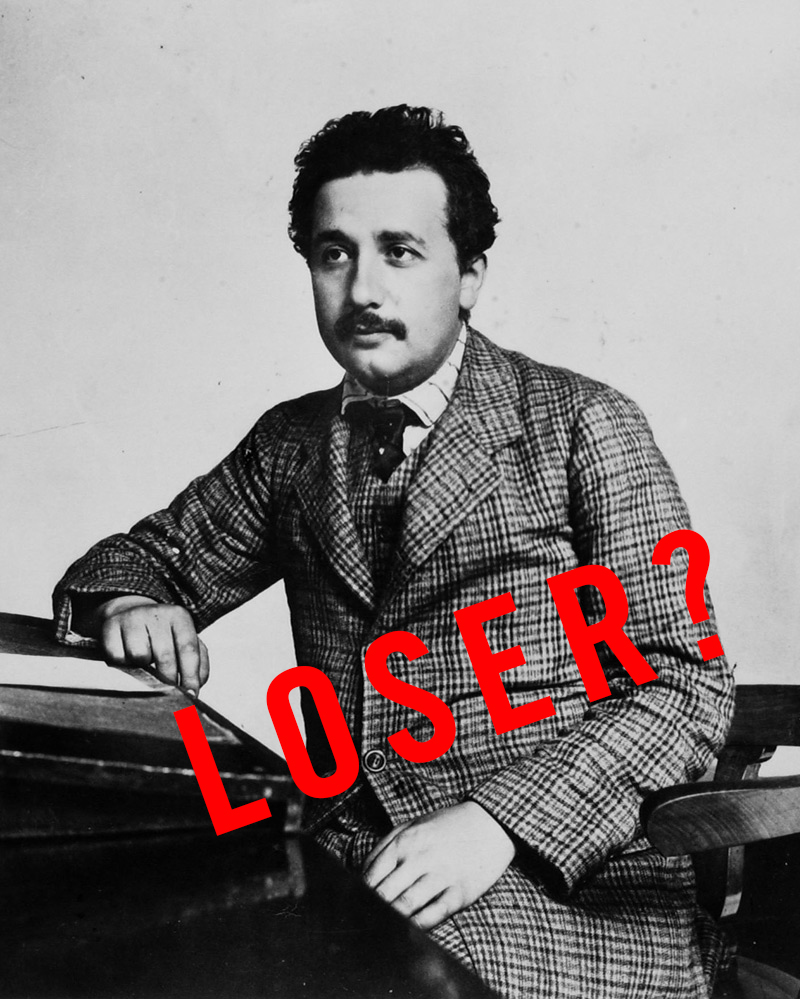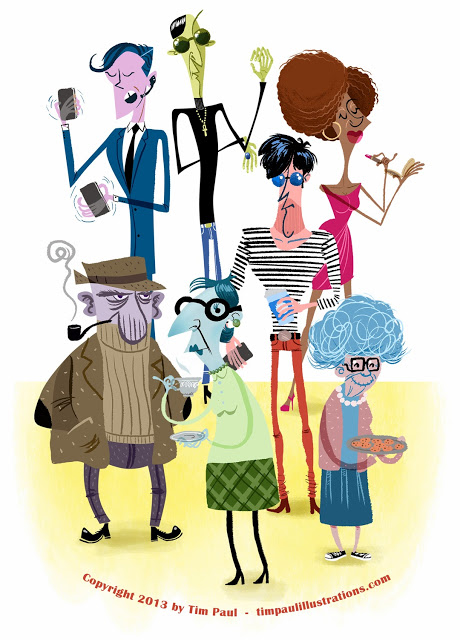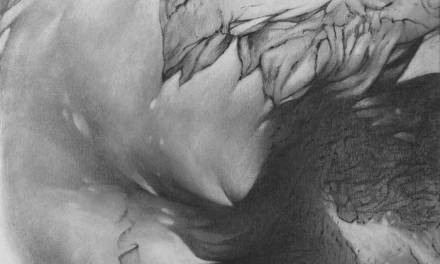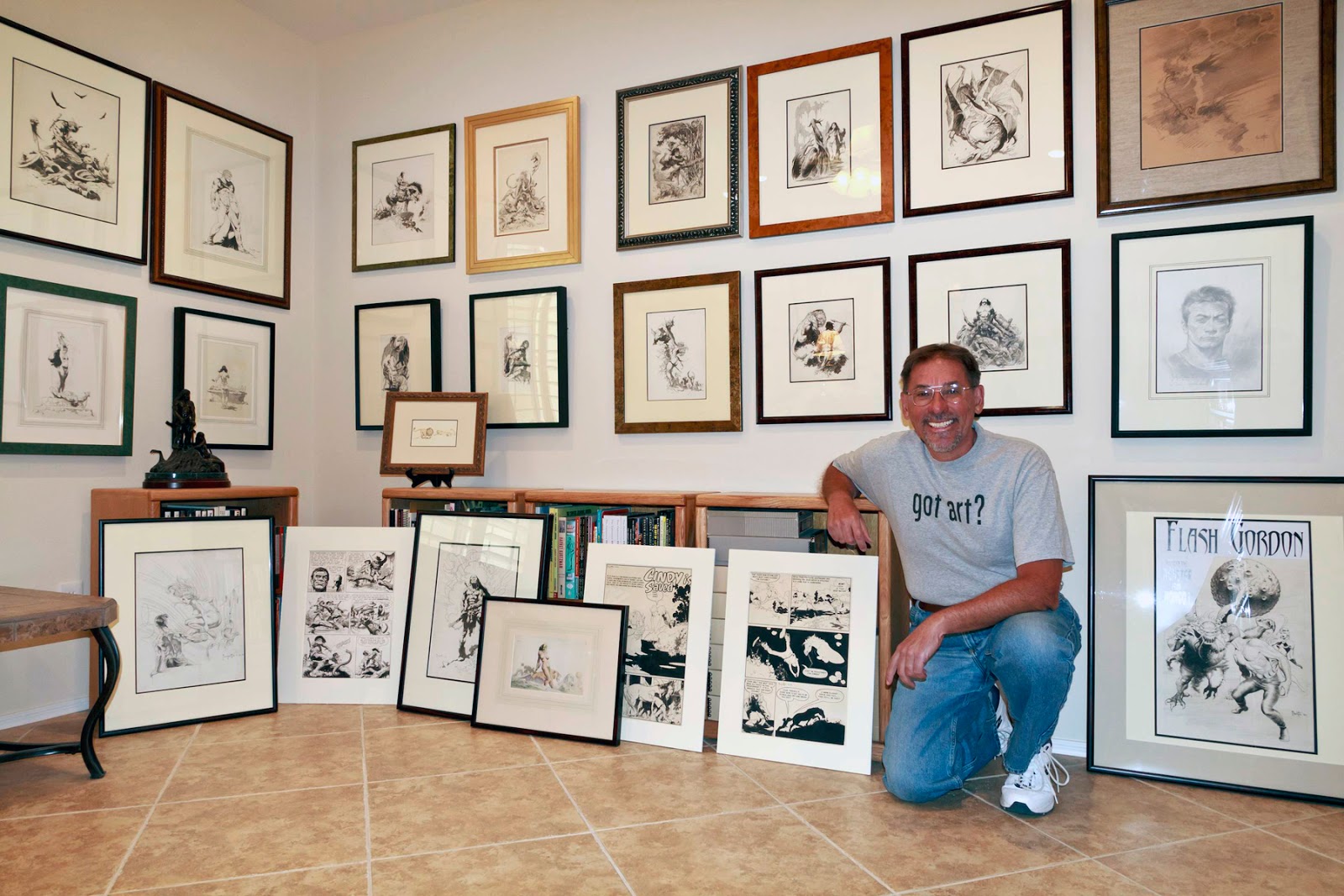I’m writing this post from my first DragonCon, and taking an extra slot this week since I’m here with Dan Dos Santos, fellow columnist and fearless leader of Muddy Colors, and he is stuck at his Art Show booth currently with zero internet. I’m an Art-Director-At-Large and I’m not stuck at a booth so I said I’d go find some internet and do an extra post. I happen to have a topic that works nicely with the “Imitation Game” post from earlier this week, in which I dispel some myths about whether practicing by copying art or using reference photos in art is “cheating” somehow (spoiler: it’s not). Today I’m going to tackle another myth: Whether you’re a “real” artist or not if you have a day job to support your art career.
It’s no secret that Western popular culture (if not world culture at this point) is obsessed with youth. It started in the 50s, when advertising execs realized that marketing to teenagers got you customers for a much longer time than marketing to their parents. Youthfulness quickly became the beauty standard as well as the power symbol. Add to that our era of internet startups and 20-something millionaires and “_____ Under 30” lists and it suddenly seems like if you haven’t “made it” by 30 you’re a failure. This is not the case in history, and it’s ESPECIALLY not the case in creative fields like art. Child prodigies are impressive but true genius takes time to develop, and more importantly, it’s takes life experience. DaVinci would have been considered a complete failure until his 40s.
I think there’s a lot of pressure on people to know exactly what kind of artist they’re going to be and be able to fully support yourself from just your art very quickly. Some artists will come out of school or training and be able to make work that pays, either by finding a devoted fanbase quickly or just by chance having a very in-demand look. However, I think most artists need time to develop their skills, their style, and their network. These artists are by no means lesser talents. Very often it’s those artists that develop slowly that have the true staying power in their careers. I’ve seen it happen many times that when success comes quickly, it can set that artist up for failure later on, because they don’t know how to deal with disappointment when their career hits a rough patch.
It is always my advice, if your art isn’t paying your bills yet, and that is stressing you out so much that you have trouble thinking of anything else, and you’re starting to make stylistic choices by what you think is going to sell rather than what your true artistic voice is, then get a job. Maybe it’s just part-time. Maybe it can be art-related, like working in an art supply store or apprenticing to a more-established artist. Maybe it’s just retail. (Let me tell you, nothing will teach you more about audience and buying habits than working retail.) This does not mean you are less of an artist. Just do not fall into the quicksand — you must remember that being an artist is your real job, and this other job is just supporting that. You have to stay dedicated to practicing and continuing to develop your art. Sometimes people find that so hard to do that yes, they would rather do things like eat ramen, move back in with their parents, or move to the middle of nowhere so that they can be full-time artists right from the beginning. That’s fine too. But it is not inherently more noble to do so. Enough already with this myth of the starving artist being the only true artist. You are not “An Artist” any quicker if you do or do not have a shift at Starbucks. You are not more noble without healthcare, trust me.
Or don’t trust me, but trust Albert Einstein. While he was writing his most famous papers on relativity, he was also working a day job at a Swiss patent office, and he liked the structure it gave to his work.
From Walter Isaacson’s Einstein: His Life and Universe:
So it was that Albert Einstein would end up spending the most creative seven years of his life— even after he had written the papers that reoriented physics— arriving at work at 8 a.m., six days a week, and examining patent applications. “I am frightfully busy,” he wrote a friend a few months later. “Every day I spend eight hours at the office and at least one hour of private lessons, and then, in addition, I do some scientific work.” Yet it would be wrong to think that pouring over applications for patents was drudgery. “I enjoy my work at the office very much, because it is uncommonly diversified.”
He soon learned that he could work on the patent applications so quickly that it left time for him to sneak in his own scientific thinking during the day. “I was able to do a full day’s work in only two or three hours,” he recalled. “The remaining part of the day, I would work out my own ideas.” His boss, Friedrich Haller, was a man of good-natured, growling skepticism and genial humor who graciously ignored the sheets of paper that cluttered Einstein’s desk and vanished into his drawer when people came to see him…. Indeed, we should not feel sorry for Einstein that he found himself exiled from the cloisters of academia. He came to believe that it was a benefit to his science, rather than burden, to work instead in “that worldly cloister where I hatched my most beautiful ideas.”
Recently I was reminded of this while listening to one of Orbit’s authors, Nora K. Jemisin, talk about why she went back to having a day job – I’m paraphrasing, but the gist was, she had a large enough advance to write her book that she gave up her day job – and that’s supposed to be the big goal of any artist, right? But she soon found herself missing her day job and it’s structure, and she soon found herself taking a job again – one that allowed her to still write, and supported her more comfortably, and exercised a part of her mind she still felt was important. You can listen to the full podcast HERE.
So don’t let anyone dictate to you whether you feel like an artist or not. Are you making art? Then you’re an artist. Whether you’re a starving artist or an artist that has to get up a 6am every morning to make art before they go to work, you are an artist. Keep working, and keep improving.








Perfect advice for me! Thank you for writing it, I need to be more practical!
You give hope to my 65 year old heart! Thank you!
I'm in my mid-40s, and recently took a buyout at my job. Not because I thought I was going to support myself with my art (I'm definitely not there yet, if ever), but because I was at an absolute dead end, and also I could really use some TIME to get a lot of little art-related ducks in a row. I intend/hope to go back to work soon so that I can continue supporting my art career with a day job. But the extra time every day is really paying some dividends (time to get my website in order, time to get business cards printed, time to network – a lot of stuff that has nothing to do with practice, and everything to do with getting s— done).
Thanks for writing this, Lauren. It really helps to hear this.
Thanks Lauren, this was a good read.
I've been working full-time and doing my illustration on the side for a few years now. I do work as an Artist at my full-time job, just not the kind of art I want to do long term. And it does get frustrating not having more time to work on my illustration work BUT, at least I can work on my own personal art without worrying about finances. And if I get freelance work, it's a nice bonus. So even though frustrating, it has its perks. It will be nice to work full time on illustration though; one day!
I SO needed to read this today. THANK YOU for deciding to go find some internet and writing this article!
I really appreciate this Lauren. It hits so much of my experience with things over the last few years, I've held a variety of jobs (none art related) since finishing art school and even recently got laid off from one. I still made time to sketch and/or paint everyday, yet my doubt has kept on growing as far as my skills and direction I am heading. Your post has helped to give me a nice change of perspective.
One of your best posts!
Appreciate the effort and message in this post, Lauren!
Wonderful inspiring post Lauren. Thanks for this.
Amazing. This post and the two video essays is the most inspiring thing I've come across in a long time 🙂
I love this post, Lauren. Thanks for broadcasting these truths. Great things to hear – even for myself 😉
Sorry for the multiple comments… Not sure what happened. Posted from my phone, and must've had something goofy happen.
Well done Lauren.
This really hit home, especially for aspiring artists like me whom is still in the learning stage. I have no idea what I want to do that, hence when I finish school I will go for the job I studied for, and use the experience I gain there to somewhat incorporate to my artworks as well.
I truly believe every experience can aid with whatever art work you plan to do, since you're communicating with peoples, experiencing different kind of job situations, and a lot more.
Thank you for sharing this article. Great eye opener :)!
THANK YOU
This article felt like a reassuring pat on the back. Thank you.
After working freelance for many years, I'm glad to have a day job and create my art, by following my muse. Thank you for a wonderful article.
Excellent article and video… failure is a part of success… Thanks!
I definitely agree with 99% of this article. Been there, done that.
However, I disagree with one sentiment: “…to make stylistic choices by what you think is going to sell rather than what your true artistic voice is, then get a job. “
If as an artist you get a sense for what is going to sell or what not at which event, it is a good sign that your business-sense is going to develop. I´d go as far as saying that without that feeling any artist has to get a dayjob, because it is not possible to succeed anywhere without that specific sense.
I have to admit that it should not overshadow the artistic goals. In the best case both work well together. You get feedback on conventions and bring that into your further work that is a natural process and in turn you get better. Repeat that 10 times and you undoubtly will get a feeling for what is going to sell and what not. I hope that makes sense.
Fantastic! I saw the first video before but didn't know there was a follow up! Thanks for this great article! =)
Great post, yet again. Thanks so much!!
Really inspiring Lauren, thanks for this one 🙂
Thanks 🙂
Thanks
Thank you so much for writing this, a month ago, it was a huge blow to my ego. My artwork wasn't getting me work and I would have to get a part time job or be on the streets. I now know that I needed that ego to deflate a little, and that I really benifit from extra structure in my life. (Also, I lucked out and got a sweet job working in a locally owned toy store chain, so it is also a blast working there!)
<3
No work is wasted.
Of course, I think it was understood that I meant you shouldn't choose what art you make ONLY on what will sell. Having an understanding of your audience and niche is an important part of being an artist.
<3
Glad you all liked the video – I watch it every so often when I've panicked myself into a tizzy of self-hatred for not getting more done. I know that probably sounds silly coming from me, but it's true. Constantly struggling to find the balance between “OMG MUST DO ALL TEH THINGS YESTERDAY WHY HAVENT I GOTTEN EVERYTHING I WANT TO DONE?!” and “Whew. Deep breath. Enjoy what you have been able to achieve.” Someday I'll get there…
Thanks for your reply. I think selling isn´t the right word, but it describes the incentive really good. Sure thing is that, when starting out, you can not follow the money because people may not buy from you. But there are other statistics that can be considered or measured. As you said, getting to know your audience is probably the best way. What I meant was rather targeted towards artists who are in the middle of their career, because then money and decisions around that matter are an issue.
Make money with Clixsense. Join to free.
http://www.clixsense.com/?8172285
http://onlinejobsandworkforyou.blogspot.cz/
There are the best possible meaning and the values emphasized in quite a good way so it will be quite good for students as well to check out the facts and probabilities which are even said to be of most importance. latest resume format for experienced
Thanks, excellent post
Thanks, excellent post